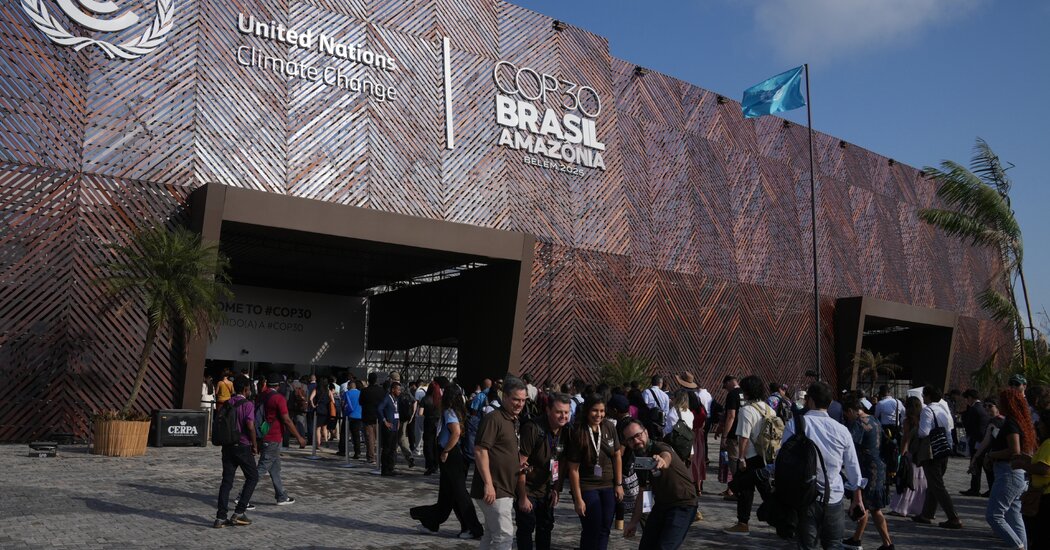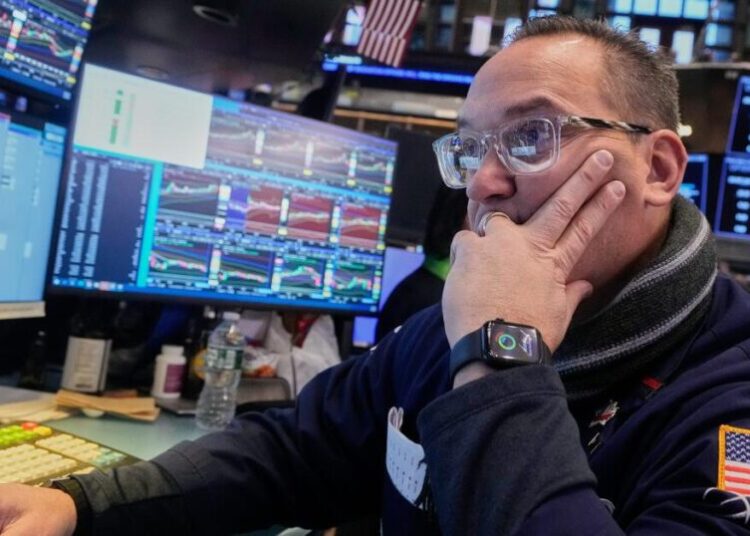Top U.S. government officials are skipping the annual United Nations climate summit for the first time in 30 years. And many American corporate executives appear to be following their lead.
Though few executives have joined President Trump in calling climate change a hoax, some have recently suggested that it is perhaps not deserving of as much attention as it has been getting. Their attitude is not so much climate denial as it is a rejection of the past framing of the issue, a stark shift from the advocacy and commitments made at summits held under different political conditions.
The leaders of America’s biggest companies once made pledges to stop polluting, formed coalitions to fund the energy transition and called on governments to pass laws that would reduce planet-warming emissions. But at this year’s U.N. climate summit, no prominent American leaders made the trip to in Belém, Brazil, a city on the edge of the Amazon rainforest.
“Obviously, it has to do with the political climate in the U.S.,” said Sonia Dunlop, chief executive of the Global Solar Council, a trade organization.
Previous iterations of the summit have drawn influential chief executives including Tim Cook of Apple, Darren Woods of Exxon and Brian Moynihan of Bank of America. The absence of such figures has been interpreted by attendees as further confirmation that the United States under Mr. Trump has turned its attention away from climate efforts.
Mr. Woods was at an event on Friday in São Paulo sponsored in part by the U.S. Chamber of Commerce. But he skipped the Belém summit after attending previous gatherings in Baku, Azerbaijan, and Dubai, United Arab Emirates.
“Our company — I think more generally the industry — doesn’t take issue or exception to the objective in terms of what the world is trying to do with emissions,” Mr. Woods said during the event in São Paulo. “I think our challenge, and where we have a lot more debate, is how we’re trying to accomplish that.”
Humanity’s challenge should not be framed as how it can “get rid of oil and gas,” he said. It should focus on ridding the planet of “emissions associated with the combustion of oil and gas,” he added.
That sort of position has been on display during the summit in Belém as the U.S. business community tries to navigate what some describe as a minefield. One big concern is that top executives who publicly commit to addressing climate change could end up hurting their companies by riling up Mr. Trump and his aides.
Since returning to office in January, the president has aggressively dismantled federal climate efforts.
On his first day in office, he withdrew the United States from the Paris climate agreement and declared an energy emergency, which he has used to justify additional fossil fuel projects. Since then, the Trump administration has slashed regulations aimed at limiting pollution, attacked the renewable power business and moved to boost coal, gas and oil production.
This year, several big technology companies acknowledged that they would not meet their climate targets because of their investments in power-hungry data centers needed for artificial intelligence. Even before Mr. Trump’s second term began, many of the country’s biggest financial firms had quit their industry climate alliances. And after speaking out against Mr. Trump’s rollback of climate policies during his first term, many chief executives have gone quiet this time around.
“It may not be worth a particular C.E.O. coming to COP to talk about what they already are doing,” said Dan Carol, a senior director of climate finance at the Milken Institute, using the acronym for the U.N. summit, which is known as the Conference of the Parties.
Some big American companies sent other executives to Belém — the chief sustainability officers of Google, Microsoft, Amazon and Mastercard all attended the summit there.
Mr. Carol’s group, a research organization created by Michael Milken, the bond financier pardoned by Mr. Trump, held a climate investor symposium on Sunday and Monday in São Paulo, more than 1,500 miles from Belém. It was one of several climate-related corporate events in Rio de Janeiro and São Paulo, the two cosmopolitan metropolises in the south of Brazil.
Some U.S. energy executives like Mr. Woods of Exxon attended those events instead of the summit. In addition to the Trump factor, visitors to this year’s summit have been stymied by the paucity of hotel rooms and other infrastructure limitations in Belém.
Mr. Carol said investors were still interested in projects that reduce greenhouse gas emissions. But the kinds of investments they are looking at are shifting, with certain varieties clearly on hold as the long arm of the White House reaches and shapes conversations in Brazil.
Exhibit A for how corporate executives are changing their tone, at least in the minds of some scientists, came last month in a memo from Bill Gates, the Microsoft co-founder. In it, he warned against climate change alarmism and said it “will not lead to humanity’s demise.” Many saw his comments as a reversal of his past positions on climate change, and Mr. Trump and many Republicans seized on it as a win for their side.
But just days before the summit in Belém, Mr. Gates said at the California Institute of Technology in Pasadena, Calif., that any suggestion that he had reversed his position that climate change was a global problem was “a gigantic misreading of the memo.”
Mr. Gates said he intended to spend more money on climate mitigation.
“I didn’t think the memo was going to convert the nonbelievers into believers, and sure enough, it didn’t convert them,” he said.
Mr. Gates’s move to clarify his position has only intensified concerns among world leaders, environmentalists and others that business leaders are retreating under pressure from the Trump administration.
The White House has dismissed the meeting in Belém. “President Trump will not jeopardize our country’s economic and national security to pursue vague climate goals that are killing other countries,” Taylor Rogers, a White House spokeswoman, told The New York Times this month.
Sebastian Buckup, managing director of the Center for Nature and Climate at the World Economic Forum, said he did not believe there was a “boycott that can be traced back to political positions.” But he noted that as the debate around climate became more routine, “many of these things have moved down the hierarchy of the company.”
Among those noticeably absent from this year’s U.N. summit are some of the most prominent U.S. electric utility executives.
Calvin Butler, president and chief executive of Exelon and the chairman of the Edison Electric Institute, the industry’s main trade organization, is not attending the summit because of scheduling conflicts, a spokeswoman said. He told The Times in a recent interview that he remained committed to “driving what we do to net zero.”
Several investment banks and big tech firms also sent executives to events in São Paulo and Rio de Janeiro ahead of the meeting in Belém.
At the Milken event in São Paulo on Monday, Gov. Gavin Newsom of California, a Democrat, harshly criticized the Trump administration for refusing to send anyone to the summit. He also said that he was “surprised not every damn governor is out here” and that corporate executives should not retreat from events like the climate summit, despite the potential blowback from Mr. Trump.
“We fight back,” Mr. Newsom said before heading to Belém.
At the opening of a leaders’ meeting ahead of the main U.N. climate summit, the former New York mayor Michael R. Bloomberg announced more investment to tackle climate problems. Mr. Bloomberg pledged to invest $100 million from his foundation, Bloomberg Philanthropies, to accelerate efforts to cut emissions of methane — one of the most potent planet-warming gases.
Some business executives from other countries also made the trek to Belém. Among them was Andrew Forrest, the Australian billionaire behind Fortescue, a mining company.
Between intermittent downpours, Mr. Forrest welcomed guests to his ammonia-powered boat, which emits fewer pollutants than traditional ships. Former Vice President Al Gore was among them.
Mr. Forrest said he had come to the U.N. meeting to demonstrate that some business leaders remained committed to tackling climate change. He lamented that a proposed international deal to reduce emissions from the shipping industry had been derailed by “a certain president not wanting to be proven wrong by the rest of the world,” a reference to the Trump administration, which scuttled the talks.
But Mr. Forrest added that the economics of clean energy were moving in the right direction, and he expressed optimism that the coming decades would see rapid reductions in planet-warming emissions.
“History always delivers,” he said. “In the end, right will win out.”
Ivan Penn is a reporter based in Los Angeles and covers the energy industry. His work has included reporting on clean energy, failures in the electric grid and the economics of utility services.
The post Missing at U.N.’s Climate Meeting: American Executives appeared first on New York Times.




